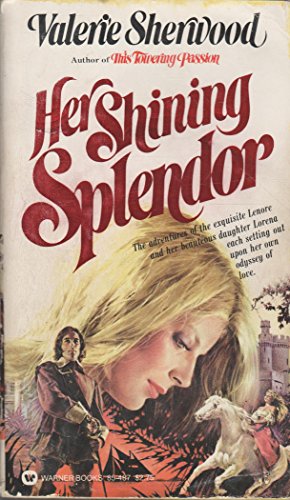Fiction has many purposes. Entertainment, education, enlightenment, and learning empathy are the big four I can think of right now. Good fiction should do all these things, sometimes without your notice. As you learn and grow, the lessons may get more subtle. Maybe the book is just brain candy,1 meant solely to entertain, and author didn’t mean to do anything Read more
genres
De gustibus non est disputandum
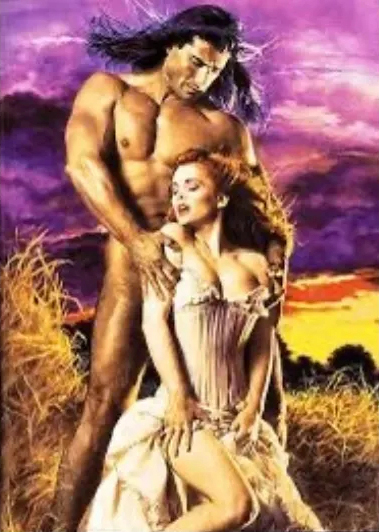
The Clinch™, starring Fabio and whoever the girl is, I don’t know.
While that is true, in general, women’s art is seen with some disdain regardless of what it is, how well it’s done, or in what cultural/societal conditions it’s made, I’ll save you the feminist rant. For now. You’re welcome. Read more
The little things that do not show
“All day I did the little things, the little things that do not show; I brought the kindling for the fire, I put the candles in a row, I filled a bowl with marigolds, the shallow bowl you love the best—and made the house a pleasant place where weariness might take its rest.”
—Blanche Bane Kuder
“The Blue Bowl”
The making of Dunham
And so begins a post (or series of them) (you know how wishy-washy I am) on Dunham, the privateer-heroine and pirate-hero Revolutionary War swashbuckler, which, for those of you not following the serial, will be available for sale JULY 4, 2013.
To kick it off, here’s the final cover for the official book: Read more
Reviewing too close to home
I wrote on this topic two months ago.
I still don’t know what to do, but I’m losing my patience because I discovered that writers of some of the stuff that’s really bad are giving writing advice. Oy. Stop it. You’re not qualified to give writing advice. Really.1
In light of this post and this comment, Read more
Writers, reviewing
The last year or so (by my completely unscientific method of measuring time, which is to say, “It feels like a year, what, it was only a week, it wasn’t a year? It felt like a year … ”), there have been increasing conversations across Romancelandia about whether writers (especially those writers who are not Nora Roberts) should review books and give them less-than-glowing reviews.
It’s coming to a head now.
Eh, I don’t really care about reviewing books from Romancelandia. There are A LOT of books and A LOT of romance readers, and so other people do that just fine. More to the point, I don’t really care to review, because some books seriously just piss me off and then my head would explode online and that’s always a mess to clean up. Actually, the only books I really want to write about are the ones that piss me off, and so that would skew my blog the other way, making me look like a recidivist toxic bitch.
Oh. Wait …
Anyway, I’ve reviewed some books. I’ve pretty much stopped reviewing books, except for a notation here and there on my Reading List. I’m on the fence about the “be nice and also it could wreck your career” versus “I’m a reader too and I have a right to review honestly and fuck you if you don’t like what I say, especially if I paid money for your book and spent time I could’ve been making money to read it.” I just hate feeling taken advantage of by a bad book, in both money and time.
All that said, I do have my foot in one lit world (Mormon lit) that’s so small that if nobody reviewed anything, nobody would get reviewed at all. And that’s a shame. Because some of the stuff I’ve been reading, put out by the major Mormon publishers, is really bad. And the stuff that’s really good (i.e., brilliant, e.g., Bound on Earth by Angela Hallstrom) gets lost in the shuffle because a) people who want to read good stuff will assume it’s bad and b) people have been reading schlock so long they don’t know what’s good.
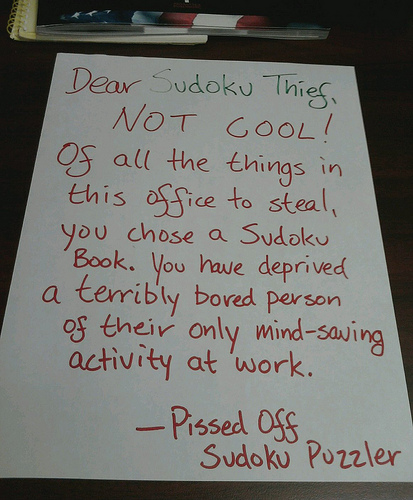
But you know, from the cradle, we’re trained to be nice. (Clearly, most of that didn’t take with me.) Our cultural heritage is Nice. And so what does Nice get you? Crap work because nobody wants to say, “This is crap work. This is why it’s crap. Everybody, take note. Don’t write like this.”
Actually, what I want to say is, “This was vetted by a Gatekeeper who asked money for it, and I spent that money and I spent the time based on the fact that it was vetted by a Gatekeeper, and now I have to wonder what the Gatekeeper thinks is good writing, because this ain’t it.” Our market is flooded with (sub)mediocre writing, and it distresses me. I’d rather have nothing than most of what passes for good in our market. Are we so starved for “clean” content that we’ll take anything we can get and call it good?1
Now, after reading Shelah Books It lit blog, I think I may have to gather all my little courages together and review the Mormon lit I read, because she has said, in language I can grok (i.e., cranky), what I’ve been thinking all along.
And I can’t be the only one.
______________________________
1. Please note: I did not give the name of this book because I felt so bad about about what I had to say. In the comments, an anonymous poster came after my book with the same complaints. Oh, I don’t care if she doesn’t like my book; a lot of people won’t. What I care about is that she felt she had to post anonymously. Because in our culture, when you can’t be Nice, you be Anonymous.
“Clean” does not equal good.
I want to talk about LDS fiction, the kind Deseret Book and Covenant and Cedar Fort publish.
This is not a rant. I’m not being sarcastic, nasty, snarky, hateful, bitter, or any other pejorative one might chalk up to my tone. Whatever one might read into it, what I’m feeling right now is a deep sense of disappointment.
I have several LDS novels in my bookshelf by well-known LDS niche authors. There are two I have tried to start, but while the premises are interesting, they aren’t exactly my cuppa. The prose is adequate. They aren’t boring. I put them aside for when I’m in the mindset to read them.
This past week I started a book that’s right up my alley: contemporary romance. I was really looking forward to reading this book. Imagine my dismay when I started reading prose that is amateurish at worst, and at best, suited for 12-year-old girls. It is a series of choppy sentences strung together. There is no discernible rhythm to it. There is no ebb and flow. The dialogue is stilted and too infodumpy about LDS customs and rituals, which made me wonder for whom the book was intended, if not LDS. (We already know this stuff; don’t instruct us in our own culture.) There is no nuance, no allowance for a sophisticated reader, no subtext.
At the convergence of this post on the Association for Mormon Letters blog by Annette Lyon concerning the “clean”ness of books and an inability to find any clean romances in the national marketplace1 and my soul-deep disappointment in the book I was struggling with (“soul-deep” is not hyperbole), I realized that LDS fiction needs to stop worrying about a book’s “clean”ness, because that’s the default position, and start concentrating on eradicating (sub)mediocrity.
1. I’m not sure why it’s important, noteworthy, or desirable to have LDS fiction without LDS characters or anything relatable to the culture. You can get “clean” non-LDS fiction in the national marketplace. You cannot get LDS fiction in the national marketplace. If you’re gonna be niche, be niche.
Free agency
Mormon publishing is a small world, but since I only hover on the outskirts of the community as a fiction writer who is Mormon and not as a writer of Mormon fiction (albeit I have Mormon characters), I don’t have much invested in the state of the Mormon art.
Currently I’m involved in a discussion on the Association for Mormon Letters blog that led to these comments:
Author Annette Lyon said:
Angela also hit it right on the head when she said that it’s a bit tricky naming names and titles when you’re one of the LDS writers yourself. It was a different story before I was part of that group. It’s easy to praise, but this is a tiny sandbox. An offhanded remark can make an enemy, so imagine if I were to give an honest review of that other book. Yeah. Let’s just say I don’t dare.
Author Lisa Torcasso Downing said:
Like Angela, I’m hesitant to criticize other writers—and their publishers—because a) who am I to talk? and b) I need those publishers.
There was a level of pathos there that I don’t feel that deeply with unpublished writers of work aimed for the national market, and not a niche one, and such a niche one. Actually, it was the “I need those publishers” that made me hurt.
I can understand Annette’s position, as she’s established and seems to do very well within the niche. But this is what I want to say to Lisa et al: You do not need those publishers.
Look around. eBooks, podcasts, print-on-demand, serial fiction blogs. The landscape is changing drastically and at breathtaking speed.
My question is: Could you do worse on your own? Really?
Just think about it. Please.
The core of genre romance
For every woman who’s made a fool of a man, there’s a woman who’s made a man of a fool. —Samuel Hoffman (near as I can tell)
I read this quote long, long ago, and I swear to high heaven it was in one book of Anne Rice’s vampire trilogy (maybe Queen of the Damned?).
It resonated with me then and it still does, and I finally figured out why.
This sentiment is the heart and soul of genre romance: What woman doesn’t like to think she has that much power in either direction?
Coming out of the closet
I’ve taken a lot of heat the last couple of months because I dared to say that the bodice ripper romance was a product of its time and thus needed to be considered for the time in which it was written. Is the forced seduction PC? No, and never was. It was a fantasy, a fantasy that, if the contemporary nonfiction literature at the time is to be believed (both anecdotal and academic), was common. Considering the number of those written and sold, I’d say it was a pretty popular one, all dressed up in period clothing and the mores that clothing represented.
Also lately, around the romance blogs, historical and contemporary romance/erotic romance with bodice-ripper elements have been ridiculed, maybe rightly, maybe not. But in a romance reading public that’s taking to male/male romance and BDSM romance, this abhorrence of the longest-running sexual fantasy in romance is bewildering to me. Women have their fantasies. Some of them involve the forced seduction. Is it PC? Absolutely not. Is it valid? Yes.
Genre romance has always thrived on the power imbalance between the male and female, but this has its caveats, and the caveats make up the majority of the fantasy:
- The heroine is always clearly superior to any male in her milieu except for the hero, who is the only male strong enough to conquer her.
- The heroine is always isolated from female companionship for many reasons, one of which is that she is superior to all other females and thus, the object of female derision/jealousy. If there is a female, she takes on a mentor/sister/mother/fairy godmother persona.
- She’s already attracted to him and he gets her off.
- The “asshole alpha”’s transformation into acceptable mate material depends on whether his eventual groveling is equivalent to his previous assholishness.
- He better damn well grovel and do it right.
- At the end of the book, the reader knows that while the heroine can go on and live without the hero, the hero cannot live without the heroine. He always winds up more dependent on the heroine’s love and presence than she is on his, turning the power imbalance 180 degrees.
- It’s all about the groveling.
Other than the innumerable authors who write the six Harlequin Presents novels every month, I can’t really name any contemporary romance authors who write the “asshole alpha” except, perhaps Susan Elizabeth Phillips, and boy does she write good groveling, viz. Kiss an Angel, which is one of only five romances on my DIK list1 (and the only contemporary).
Lately, Anna Campbell and others have come back with the bodice ripper, but again, they write historical and I don’t think it does anybody any good to pretend that some of these characters are a century or two more enlightened than the people around them at the time.
The power imbalances in my own book have been pointed out to me with startling clarity, and I’ve been chewing on this for days, not because I disagree in the case of Knox and Justice (an homage to the Harlequin Presents line of books I cut my teeth on and my best crack at writing an anti-hero), but because I do disagree in the cases of Giselle and Bryce, and Sebastian and Eilis. I’m not going to go into why because that entails spoilers.
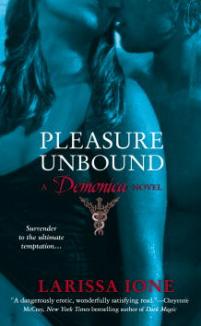
What ultimately brings me to write this post, though, is because lately, despite my professed ambivalence (possibly distaste) for paranormal romance and urban fantasy, I’ve been reading a few books (that I liked!) that have led me to a conclusion:
The asshole alpha still lives and breathes, as assholish as he ever was. The bodice ripper hasn’t gone away. The forced seduction hasn’t lost its appeal.
It’s morphed.
Into demons, werebeasts, vampires, ghosts, ghouls, goblins, and things that go bump in the night. In many, many cases it’s further disguised as the (overused) “one true mate and nature has given us no choice” device.
Only now, because it’s dressed up in con clothes and otherworldly window decoration, it’s perfectly acceptable. Except … some of us don’t care for the window dressing.
I also made a statement a while back that a lot of Mormon authors write our basic tenets and philosophies and beliefs and religious history in science fiction and fantasy, where it’s almost or fully unrecognizable to non Mormons. I said that I thought it was cowardly. I was told by one author that his first instinct was to write science fiction/fantasy and that the incorporation of our doctrine, traditions, and culture was secondary. I believe that—for that author. I don’t believe it across the board.
Why does this happen? Perhaps because suddenly, one person’s fantasy/message is another person’s call to battle?
I don’t write that way. I can’t wrap the bodice ripper up in paranormal and urban fantasy paper and put a shibari bow on it because that doesn’t appeal to me, although the sex probably will. I can’t put a pretty dress on what is, to many readers, an ugly philosophy/belief system in science fiction and fantasy because that doesn’t appeal to me, although the philosophy will.
This is why I like erotica, because, by its very nature and reader expectations, it’s bald. It’s honest. It’s also why I did actually appreciate The Actor and the Housewife for one thing: It put our culture and beliefs and jargon out in the open honestly, naturally, with no apology or preaching.
I want it straight and I write it that way. I call it what it is because that appeals to me, the honesty of it, the setting of human-as-animal in a contemporary world where our baser wants and needs are not only taboo, but ignored as if they don’t exist. And likewise, where our spirituality/religious beliefs offend a whole lot of people, and short shrift is given to the struggle between the natural (human) man and the enlightened (human) one, who attempts to control himself and sometimes simply doesn’t.
I have no issue with control, losing it, struggling with it, conquering the natural man. After all, that’s why we’re here, right? To vanquish the natural man?
But I’m interested in the process.
And the groveling.
Whatever universal truths are revealed in fiction, no matter how they’re portrayed, I don’t give a shit about vampires or demons trying to overcome their natures to be moral creatures because vampires and demons don’t exist.
I don’t give a shit about a being (possibly alien) who drives a spaceship for a living (or who has some fantastical adventure) who’s going through some vague spiritual struggle that Mormons can drill down to the most minute nuance, and might kinda look like Mormonism to anybody with a passing familiarity, because I can’t relate to that.
I can relate to asshole people whose feet are planted on earth, who don’t have regular contact with the boogeyman or aliens, who have no magic or fae blood, no superpowers, who strive and fall and fail and lose themselves in their baser natures, who want something better for themselves but may not know how to get it, who make bad choices and know it even while they’re doing it, who depend on other people or a religion or a deity or a philosophy to help “fix” them.
We all need fixed in one way or another, and there is always a power imbalance in a relationship. It shifts and it changes and it morphs and it takes time to level out as much as it’s ever going to. It’s a neverending process, and sometimes it seems like being on a hamster wheel.
How do I know this?
’Cause I’m an asshole and I strive and I fall and I fail and I lose myself in my baser nature, trying, always striving, for enlightenment. And because I need my husband to “fix” me, and I daresay he needs me to “fix” him, too.
And we both have to grovel.
But please, can we stop pretending the forced seduction romance, and the inherent power imbalance the male has over the female is gone? It’s not. It never will be. We like it too much, and, as a fantasy, it’s no less valid than the up-and-coming PC fantasies of male/male romance or BDSM romance in all its incarnations.
It’s just been driven into the closet.
______________________________
1. A DIK, otherwise known as a Desert Isle Keeper, is the kind of book you’d want with you if your ship went down at sea.
Book Review: The Ugly Princess
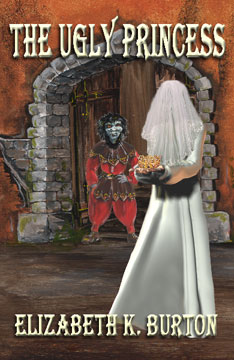 The Ugly Princess
The Ugly Princess
by Elizabeth K. Burton
Published by Zumaya Publications
The only thing wrong with this book is the cover. Blech. (Although the irony is cute.)
But I didn’t beg the author to point me to an e-copy (which she so obligingly sent me in a format I could use, yay customer service!) because or in spite of it. (It’s only currently available in dead-tree version; I expect it’ll show up on Fictionwise soon.)
Here’s the official blurb:
The king is dead, long live the queen!
Well, not if the King of Nadwich and the dead monarch’s three royal ministers have anything to say about it.
It’s up to Sir Christopher Evergild, the Royal Champion, to see that the new queen survives to take her throne—even if she is so ugly she’s been locked away for twenty years with only trolls for company. Chris is prepared to do his duty, even if The Ugly Princess does turn out to be the lunatic she’s always been rumored to be.
What he isn’t ready for is having his entire world turned upside down and inside out—and having to decide between love and the fear that has haunted him most of his life.
This is going to be a short review because, well, I loved everything about it. After speaking with the author, however, I have a feeling she and I share sensibilities in our stories, so take everything I say with that in mind. Or not.
This is a fantasy with sweet romantic elements and I love the sweet stories as much as I love the hawt ones. There is no swearing or sex (oh, maybe a “damn” or “hell” here and there, but I can’t remember). It’s set in the imaginary world of Karlathia, which I envision as a fairy-tale village whose battle technology is a weird mix of firearms and medieval hand-to-hand combat.
It has two narrators (Bertram, the kingdom’s seneschal, and Christopher, its army’s chief general), and is split into first and third person, which I love. In the almost-omniscient first person, the prose is loose and funny, yet cozy because it breaks the fourth wall, yet is more formal and intense (and removed, natch) in third person. Both suit the respective narrators’ personalities very well.
Descriptions as seen through the seneschal’s first-person point of view were sharp:
He [evil monarch] cut his food into tiny bites, chewing each one thoroughly before swallowing. He did not mix the fare on his plate, finishing one item entirely before proceeding to the next.
Those two brief sentences tell me a whole lot about that character.
Bertram’s overstated understatements and asides make me smile and laugh (in fact, I’d go so far as to say he upstages Christopher, but that is not to the story’s detriment):
Going to the aforementioned clothes press, I discovered my host had an exceedingly eclectic wardrobe–everything from complete Court regalia to a set of rags that seemed held together mostly by optimism.
Demtri [idiot nephew of evil monarch], seemingly oblivious to what was happening, sat on the throne with a large bowl of grapes on his lap, tossing them in the air and attempting to catch them in his mouth. His aim was not particularly commendable.
At this point I struggled not to draw my pistol and punctuate Niklaes’s arrogance with a lead period.
It was a very fun and funny read. Bonus! I learned a new word: eldritch.
Liz, give me your Paypal address because I want to pay you for this.
Update on the creepy book.
Okay, I’m about halfway through The Actor and the Housewife and things have started to become a little clearer.
The actor is clearly in love with the housewife; I don’t believe he is in denial about this, although he puts up a good act. Because he’s an actor. Heh. He’s a nice man.
The housewife is in complete and total denial. On purpose. She’s smart; she knows what’s up. She doesn’t want to deal with it because it’s gonna be nasty messy and painful. That is to say, she’s bored and she’s lonely and she’s completely unappreciated and she’s not getting much in the way of sexual healing from her husband. So handsome clever dude comes along and appreciates her as a woman, and of course it’s gonna go to her head. All the while she’s saying, “I have the perfect husband and I love him so much!” What she needs to do is wake up and tell her husband they need marriage counseling. I don’t excuse her actions. She’s lying to herself. IMO, that’s her biggest sin and she needs slapped.
The husband is … not a creep or a dick or an asshole. He’s lazy. Possibly stupid, but I’m leaning toward lazy. He’s lazy about his marriage. He’s lazy about taking care of his wife. He’s lazy about seeing her value to him as an unpaid (oh, but she gets room and board!) maid, chauffeur, nanny, and for the occasional (I think? He doesn’t seem interested.) sexual favor. Maybe. If she pushes hard enough.
He’s disturbed by her relationship with the actor (who calls every day; tells her he misses her), but he doesn’t notice when she’s trying to be sexy for him and his idea of a romantic evening is sitting on the family room floor after the kids go to bed watching the ten o’clock news and drinking chocolate milk—and that’s AFTER he’s already had his little pout about her friendship with the actor. He never gets really mad and yells at her. He does a couple of really passive-aggressive things to let her know he’s pouting. He can’t even be bothered to manifest his jealousy properly. (Is he that sure of her or does he think she’s not attractive enough? I can’t tell.) Yet he’s not disturbed enough to seduce her or romance her (or take what she offers, for that fact); either he doesn’t know how or he doesn’t see a need. Idiot lazy ass. You deserve to lose your wife to someone who’d sweep her off her feet given half a chance. Oh wait. You already have. Fight for her, you stupid fuck.
This is turning pretty dark with (dare I say it? I shall!) SPARKLES all over it to make it look like it’s all bright and shiny and cute and fun, and that the housewife is the only one with a little problem.
So far it’s shaping up not to be so much the story of her (without doubt) emotional affair with a (IMO) pretty awesome dude who’s head over heels in love with her.
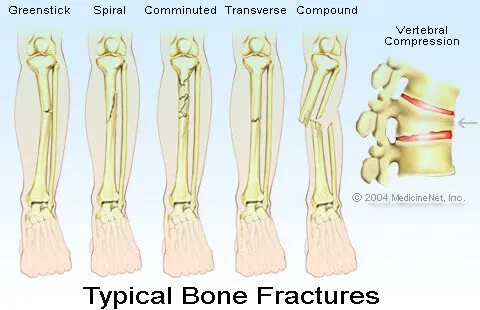 It’s shaping up to be the story of an already fractured marriage that needs the x-ray of aforementioned affair to show it for what it is. It’s not a spiral fracture or a comminuted fracture. It’s not even a clean break. It’s a stress fracture, the kind that gives you twinges of discomfort that you can ignore for a long time until it breaks and you’re like, “I didn’t do anything to it!” But catch it early enough, and all it’ll need to heal is a cast and time and a helluva lot of TLC.
It’s shaping up to be the story of an already fractured marriage that needs the x-ray of aforementioned affair to show it for what it is. It’s not a spiral fracture or a comminuted fracture. It’s not even a clean break. It’s a stress fracture, the kind that gives you twinges of discomfort that you can ignore for a long time until it breaks and you’re like, “I didn’t do anything to it!” But catch it early enough, and all it’ll need to heal is a cast and time and a helluva lot of TLC.
There’s a quiet desperation about it that’s starting to get heartbreaking (I have sprouted tears in a couple of spots). I suspect there are a lot of those kinds of marriages in the church. In a lot of churches. And outside them, too.
And oh, it’s so not chick lit. This is Women’s Fiction with a capital W and capital F. Dark and angsty without letting you KNOW it’s dark and angsty (and the bright perky cover is complicit in the deceit).
If this is where Shannon Hale meant to go without letting the reader figure out where she’s taking you, then I salute her. She’s effing brilliant.
But I haven’t finished it, so I may again change my opinion. I shoulda waited until I was finished, but this is too dense with subtext not to share as I go along. I hope it’s intentional. Dear Sister Hale, please don’t pull a Stephenie Meyer on me. Please. Pretty please.
The zeitgeist of a story
Romance novels are mocked all the time everywhere. That’s not news. What was surprising to me upon my reentry into reading and writing romance, which necessitated entering Romancelandia, the world of romance reader blogs, was that they’re also mocked by people who love romance novels.
Some books deserve it, but some that might seem to deserve it … don’t.
Those are books from the history of romance novels that are mocked for their fashions and specific song references and other tidbits of culture that date them and, quite often, the covers that were made for them at the time. In particular, very often the sweeping scope and larger-than-life characters and plots are mocked. The people doing the mocking, I find, are young and/or young to the romance genre.
I don’t know quite what they expect when they read a book from the 1970s, 1980s, or 1990s that would rightfully be fodder for mockery if written now, but the fact of the matter is, they’re not meant to be timeless in every respect. If one puts oneself into the study of romance novels, to be intellectually honest, one must also be able to sift the culture of the time and how these novels work within that.
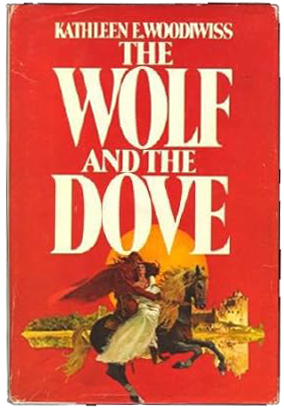
Let me put this in some context. In the early 1970s, a lady named Nancy Friday interviewed women on the subject of their sexual fantasies and published them in a couple of books: My Secret Garden (1973) and Forbidden Flowers (1975), just at the cusp of the “rape romance.” Without taking Friday’s scholarship into account, I find it interesting that many women’s fantasies at that time featured rape prominently. I also find it fascinating that these books were published nearly simultaneously with the early rape romances and thus, probably didn’t inform each other.
And then came the soap General Hospital in 1979, with Luke and Laura, which is, as far as I can tell, the most famous rape romance ever.
Mind, this definition of “rape” is not a legal one; it’s a highly stylized one in which it allows the female to retain her Good Girl status while still A) having sex and B) enjoying it because the hero is a different kind of rapist: One who is attractive, who is uncontrollably attracted to the heroine, and who gets her off after he’s made it possible for her to have an out, i.e., “I was raped.”
Why did she need an out? Because, at the time, a woman’s enjoyment of sex (especially outside of marriage) was still taboo.
(In The Proviso, one couple’s, uh, courtship [heh] is an homage to this era of genre romance.)
As an another aside, there is the shifting definition of “genre.” In the aforementioned 1970s and 1980s, many heroines typically had more than one lover throughout the course of her story, but ended happily with one. This would not happen in genre romance now unless it is a ménage à trois erotic romance.
Now, the heroine who has more than one lover during the course of a genre romance novel would not be meeting the expectations of the average genre romance reader, which is to say, sexual involvement between one man and one woman throughout the course of the book, with a happily ever after ending. (This does not speak to the fact that the male occasionally has other lovers, but in context, and with the understanding that that’s okay because a man has his needs. We haven’t come all that far, baby.)
In fact, in a Twitter conversation with (among others), @mcvane, @victoriajanssen, @redrobinreader, we decided that those romances would now be classified as women’s fiction. Naturally, our word is law.
I’m not sure why there’s this unwillingness to go along with the zeitgeist of the time in which the book was written, but instead to apply today’s standards of fashion or technology or pop culture as markers of timelessness. We don’t expect that of our historical novels, so why do we expect it of “contemporary” romances that cease to be “contemporary” the moment the galleys are finalized?
Me? I like reading the zeitgeist. I don’t miss it if it’s not there, but if it is, it’s a lagniappe for me. It gives me a feel for the time period and takes me back. Perhaps the difference is whether one is too young to be taken back or not. I don’t know.
However, in reading some earlier novels, I find this especially important because a lot of the plot devices realistically used then could not be used now because of advances in technology. If one can accept that it was 1979, and the heroine didn’t receive a letter that the hero had sent and he had no other way of contacting her or finding her to clear up a misunderstanding, one should also accept the blue eyeshadow and feathered hair.
I date my novels for a reason, which is to commit the zeitgeist of the moment in the mind of the reader, leaving no question as to its pop cultural references. In 10 years, no one can say, “That feels so dated.” They’ll have to say, “The author is very explicit about these events occurring between 2004 and 2009. If it feels dated, well, that’s because it is. It says so right in the chapter headings. Go with it.”
The expectation that one should be able to pick up a romance novel (or any other novel) from the 1970s, 1980s, 1990s, and either not be reminded that that was when it was written, or not be offended by some of the themes in the novel borne of the time it was written, seems to me that we wish to either forget that part of our history or cover up the history. More likely, however, is that we may live (and read) in the moment and may be either unwilling or unable to reference the history of the time in which the novel was written.
It’s a shame, really, because a lot of stories’ richness and layering gets lost without the proper historical context.
This book’s kinda giving me the willies.
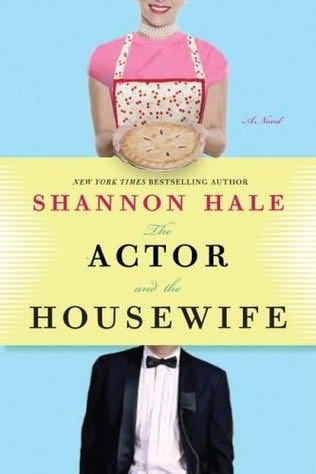 And I’m only 50 pages in.
And I’m only 50 pages in.
Right now I’m reading The Actor and the Housewife, and I just don’t quite know what to think. Here’s the blurb:
What if you were to meet the number-one person on your laminated list—you know, that list you joke about with your significant other about which five celebrities you’d be allowed to run off with if ever given the chance? And of course since it’ll never happen it doesn’t matter …
Mormon housewife Becky Jack is seven months pregnant with her fourth child when she meets celebrity hearththrob Felix Callahan. Twelve hours, one elevator ride, and one alcohol-free dinner later, something has happened … though nothing has happened.
It isn’t sexual. It isn’t even quite love. But a month later Felix shows up in Salt Lake City to visit and before they know what’s hit them, Felix and Becky are best friends. Really. Becky’s husband is pretty cool about it. Her children roll their eyes. Her neighbors gossip endlessly. But Felix and Becky have something special … something unusual, something completely impossible to sustain. Or is it?
A magical story, The Actor and the Housewife explores what could happen when your not-so-secret celebrity crush walks right into real life and changes everything.
This part is what gets me: “It isn’t sexual.”
My. Ass.
Now, look, Sister Hale. I realize that I shouldn’t be coming to this novel from the perspective of a romance reader, because it’s not a romance. (I know it’s not because the library cataloging block told me it isn’t. It says it’s “chick lit,” and library cataloging blocks don’t lie.) But I am coming to it from a romance reader’s perspective because it’s whispering naughty thing in romance’s ear at this point. Yet I don’t know a die-hard romance reader in the world who wouldn’t tear her hair out.
Becky Jack (the main character) is, thus far, what we romance readers would call TSTL. Too Stupid To Live.
Also? Flirting *kofffallinginlovekoff* with someone while you’re happily married is a HUGE romance no-no.
I had to take a break from the gore of this woman’s squished IQ and blog it. I don’t even know if I’ll be able to finish the book, except …
I must get back to the trainwreck that she is. I should turn my eyes away. Look somewhere else. But I can’t.
Tab A, slot B
If you remember, about 100 years ago in blog time, Eugene got lambasted all over the bloggernacle for his book, Angel Falling Softly, for various crimes from “not very spiritual” to “sacrilege” to calls for his excommunication or at the very least, pulling his temple recommend. Eugene’s tab did not fit into the proper slot.
A while back, I came across a blog I keep a little eye on and had commented just to clarify a point. Yesterday I noticed that “Anonymous” had chastised me for acknowledging that my book is filthy (it is) and for dropping the F-bomb in the first line of the story. The chastisement was something along the lines of, “You call that quality Mormon fiction?”
::gallic shrug::
Well, A) “quality” was used in terms of how well the book is designed by the publisher and how well it is constructed by Lightning Source and B) I don’t consider it Mormon fiction.
People have different tastes. Nice, sweet, nearly conflict-less LDS fiction wasn’t cutting the mustard for me with regard to sparkle and (dare I say it?) lust (which doesn’t have to be consummated, but could we acknowledge its existence?). Fiction by Mormon authors out in the wild might be my brand of wild but it’s short on philosophy and faith. Genre romance of any stripe, inspirational to erotica, suffers the same lack of one for the other, so it’s not us. It’s a general lack of crossover between faith and sex.
Slot B47c&&2kd existed, but there was no correlating Tab A47c&&2kd to put in it.
I, Random Reader, wanted my slot filled. I’ve been wanting it filled for a long time. And it remained empty, growing cobwebs. I wasn’t writing it, either, because I wanted to “get” published and you don’t “get” published with a mixture like that.
So I said, “Fuck it. I’ll write what I want.”
As far as I know, I only have 1 (count ’em, ONE) LDS reader who’s managed to get past the first page. That’s okay, too. I probably made a mistake in vaguely hoping I could find a small audience amongst my own who, like me, wanted something titillating and faith-affirming (er, maybe) at the same time. Or, at the very least, not anti.
What I didn’t expect was the positive reaction from non-members who found my portrayal of us as human and extremely fallible, struggling with matters of faith and sexuality, as sympathetic and relatable—and who found the addition of faith to these people’s lives just another layer of their personalities.
Eh, don’t get me wrong. Plenty of people haven’t liked it also, for various reasons including the politics and my prose style and the fact that my characters aren’t, well, very likable at times. But … I don’t like everybody else’s books, either, so no harm, no foul. Regardless of all that, though, who liked it, who didn’t, why or whatever, the fact of the matter was that for this consumer, the market had an empty slot. So I carved out my own tab. And lo and behold! I’m not the only one who liked the shape and size of that tab.
All the foregoing is to say that this past weekend, I was blessed to brainstorm projects with two religious types (one protestant, one Catholic and independent of each other) who also like the s(t)eamier side of genre romance. It doesn’t hurt that I love these two writers’ work already, but these two projects are so outside their creators’ norms AND they are outside of, well, everybody’s norms. And I love them for it. I would never have thought of these two ideas, but these ladies did and their tab fit my slot.
Now, ladies, hurry up and finish those things. I know this publisher, see …
The problem of genre: “Grit Romance”?
Labels are terribly useful to the majority of human beings. I find them useful insofar as I understand the definition of the label used, although this is usually a 50/50 proposition for me. As a method of efficient inventory control and meeting customer expectations, genre labels simply can’t be beat. The publisher knows which buyer to go to and the bookseller knows where to shelve it.
 But lately, there’s been a lot of cross- and mis-labeling going on inside genre fiction, leading readers to scratch their heads and wonder, “This isn’t X. Why did they put it on X shelf?”
But lately, there’s been a lot of cross- and mis-labeling going on inside genre fiction, leading readers to scratch their heads and wonder, “This isn’t X. Why did they put it on X shelf?”
Science fiction with romantic elements or a science fiction romance or a romance with a science fiction backdrop?
Fantasy, ditto above permutations.
Paranormal, ditto above permutations.
Speculative fiction/steampunk/cyberpunk, ditto above permutations.
Suspense, ditto above permutations.
Erotic! and ditto above permutations.
Mystery, ditto above permutations.
Spy, ditto above permutations.
Whatever other genres I missed, ditto above permutations.
A reader may or may not be willing to go along with the story regardless what it is and where it takes them (that’s the kind of reader I am), but some buy books specifically on spine label, cover cues, and back blurb so that they can get exactly (or pretty close to it) what they want.
Today, some independent publishing friends and I have been discussing our books, about how disparate our stories are, how we view ourselves in completely different genres, and how our books all have one thing in common: They are not classifiable, except by “drama.” (Well, why can’t “drama” be its own genre? Or is it? I don’t see it used anywhere.) They’re all a mix, all dark and gritty, with romance and a happily-ever-after (the one and only real requirement to be considered romance).
I don’t know how to classify The Proviso. I never did. Drama? Yeah, plenty of that. Family saga? Check. Epic? Uh, most definitely, as it takes place over the course of 5 years. But epic what? I can’t think of a book I could compare it to. Healthy doses of religion and spirituality mixed in with money and explicit sex? What? What’s anybody supposed to do with that? It’s not LDS romance/literature/fiction (defined as anything that could be sold at Deseret Book/Seagull), although I could call it Mormon fiction if a criteria of “Mormon” is that a Mormon wrote it. I call it a romance because I see myself as a romance writer.
The editors at one publishing house liked The Proviso, passed it around to get a roundtable opinion, but ultimately rejected it. “We don’t know where to put it. The religion isn’t going to go over with our erotic romance readers and the explicit sex isn’t going to go over with our inspirational readers.” That was good to know.
I know that RJ Keller, whose Waiting for Spring, got the attention of several agents, was told that she would have to extensively revise her book to be commercially viable. Most egregiously, she’d have to cut out the drug references, except … the drugs is the keystone of her plot. Hello? She finds her book marketed on all the free sites as a romance, but she does not consider herself a romance author.
Kel pointed me in the direction of Lauri Shaw, whose book, Servicing the Pole (that title’s as ballsy as using The Bewbies for my cover), had a lot of interest, but would have required extensive changes in order for it to be considered commercial. This is from Ms. Shaw’s website:
However, when professionals who were interested in selling my work insisted I’d need to make drastic changes to Servicing the Pole to make it a commercial prospect, I had to ask myself if the end justified the means. After all, these people were able to guarantee me little to nothing on the front end.
I was told that the book was too dark. That I’d have better luck catching the reader’s fancy if I made the story into something upbeat. The suggestion I took the most issue with, though, was that I ought to transform Emily into a more ‘likeable’ character. To do so would have been to change virtually every theme in this story.
I’m proud of the story I’ve written. It’s a story I can stand behind.
Servicing the Pole also has a happily-ever-after (or at least a happily-for-now), but I don’t know how Ms. Shaw labels herself as a writer, as I have not spoken with her.
Note: Our books are all dark, gritty, nasty, twisted, with a happily-ever-after. That is what’s genre-busting about them.
You can call ’em drama or epics or family sagas, or whatever you want.
Kel calls ’em “gritty romance.”
Gritty romance.
I like it.
The role of urban fantasy …
… and the kick-ass heroine.
Came across an interesting article by Jennifer de Guzman about the female audience need for a female superhero. Well, you know, I followed the links to the XY asshole type who said, “No, you really don’t.” Then I went to Jezebel’s post. Read them all, then come back. Josh Tyler (who knows what women want) posts:
Catching bad guys is not a common female fantasy.
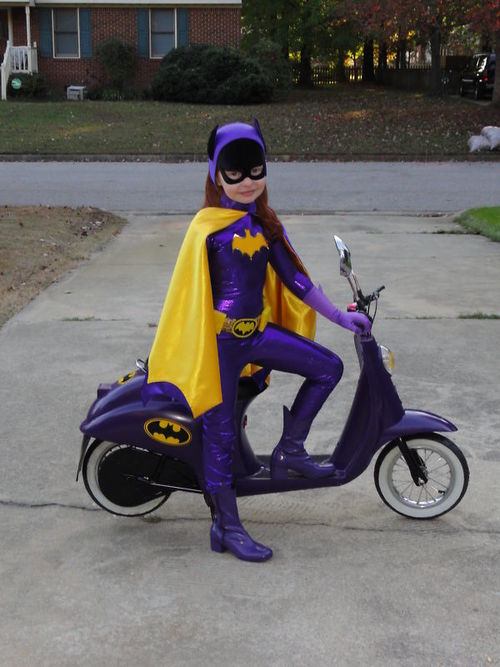 Hey, you know, lemme go back in time to my 7-year-old self and tell Little Miss Batgirl that. (Notwithstanding BatGIRL opens up a whole host of other topics and is problematic in itself.) He further digs his hole:
Hey, you know, lemme go back in time to my 7-year-old self and tell Little Miss Batgirl that. (Notwithstanding BatGIRL opens up a whole host of other topics and is problematic in itself.) He further digs his hole:
Men are interested in imagining themselves as ass-kicking heroes. Women are interested in movies about relationships and romance and love.
Now, this discussion falls under the two of my pet topics: The definition of feminism and the gatekeepers, the gatekeepers in this case being filmmakers. And I gotta say, I can think of only one filmmaker who does the female superhero well (albeit not in WonderWomanish garb): Quentin Tarantino. And he made a lot of money exploiting the hell out of her. What does he know that Josh Tyler doesn’t?
Better yet, what does genre romance know that Tyler doesn’t? This is where the genre romance gatekeepers have stepped up to the plate and it’s where women will find their superheroes, albeit it not in graphix or on celluloid.
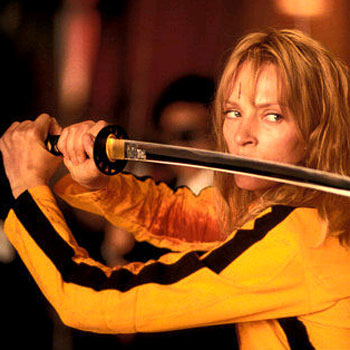 It’s the kick-ass heroine in urban fantasy. They don’t have a Batgirl or Wonder Woman outfit. They don’t have a golden lasso or an invisible plane. Sometimes they don’t come from a mysterious Other World. They have leather. They have a tramp stamp. They have guns or cross bows or daggers or swords or a combination. They prowl the streets looking for wrongs to right and bad guys who need an ass-whoopin’. Yes, yes, I hear Buffy’s name being screamed from the rooftops, but she’s not part of this discussion because …
It’s the kick-ass heroine in urban fantasy. They don’t have a Batgirl or Wonder Woman outfit. They don’t have a golden lasso or an invisible plane. Sometimes they don’t come from a mysterious Other World. They have leather. They have a tramp stamp. They have guns or cross bows or daggers or swords or a combination. They prowl the streets looking for wrongs to right and bad guys who need an ass-whoopin’. Yes, yes, I hear Buffy’s name being screamed from the rooftops, but she’s not part of this discussion because …
… most of these setups (unfortunately) involve otherworldly paranormal goo-drooling and blood-drinking types, and, quite frankly, I get tired of the endless fighting of the supernatural. How ’bout some human baddies? (This is one reason I love Beatrix Kiddo just so damned much.)
Aside: I’m not talking about kick-ass heroines whose JOB it is to be kick-ass. I’m talking about the ordinary woman pulled into extraordinary circumstances and who rises to the occasion [ahem, EILIS], or the anti-heroine who exists outside a societal structure and takes on the role of vigilante as a form of service to society (with hopes of paying restitution or redemption or at least a few cosmic brownie points) GISELLE. Or—better yet—a heroine who starts her journey being a milquetoast and ends up with a spine of steel JUSTICE. After all, we’re not born kick-ass. Life makes us or breaks us that way and the hero’s journey has never been just for men.
So here again we see that the gatekeepers (in this case, filmmakers) don’t know their audience well enough to exploit another revenue stream—but genre romance does! We’ve been subsisting on these women for decades (can you say “pirate queen”?). Clarissa Pinkola Estés even wrote a little book about the kick-ass heroine, her history, and her place in our evolutionary collective subconscious, so this?
Men are interested in imagining themselves as ass-kicking heroes. Women are interested in movies about relationships and romance and love.
He really needs to go talk to Dr. Estés or at least read her book.
Tarantino! Thurman! Thank you for The Bride. I love her. (And all of her wicked evil baddie stepsisters, too!) Now, step up to the plate and give us a female superhero only with spandex this time, ’kay? Call me!
Favorite kick-ass heroines. Who are yours?
Romance novel notes from 2008
There were the 3 Georgian historicals I liked, but thought were fairly flawed and Almost a Gentleman, the one erotic Georgian I couldn’t finish. I did, however, really enjoy The Bookseller’s Daughter and The Slightest Provocation, so I’ll give the author the benefit of the doubt no matter what.
Then there are the ones on the sidebar to the right, some of which are romance. Under My Skin by Jenny Gilliam, which I liked enough that I only stopped reading when I had to tend to various obligations, like Tax Deductions 1 and 2. And congrats to her for its sale to Amira! (A little late on that congrats, Jenny. Mea culpa.)
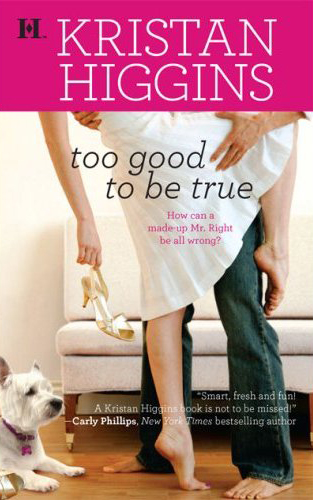 Catch of the Day by Kristan Higgins, which made me bawl and laugh and cringe in vicarious embarrassment, which was only cute/sweet because it wasn’t happening to me. Also, her Just One of the Guys, which was good but not as heartwrenching as Catch of the Day. Her first effort, Fools Rush In (which I actually read in 2009, sorry!), I found at a thrift store for a quarter and damme if that wasn’t a bargain! All 3 books are written in first person, though Catch of the Day and Just One of the Guys are in present tense (I like!) and Fools Rush In was in past tense. (I crack myself up.) You must have a box of Kleenex for these books. I remember this author’s name. For me, that’s like saying her books are auto-buy and lo and behold! She’s got a new title, Too Good To Be True. Honestly, I think she’s more what people call “women’s fiction” because she seems to focus more on the heroine’s journey than the romance. Word of warning: Don’t glom this author.
Catch of the Day by Kristan Higgins, which made me bawl and laugh and cringe in vicarious embarrassment, which was only cute/sweet because it wasn’t happening to me. Also, her Just One of the Guys, which was good but not as heartwrenching as Catch of the Day. Her first effort, Fools Rush In (which I actually read in 2009, sorry!), I found at a thrift store for a quarter and damme if that wasn’t a bargain! All 3 books are written in first person, though Catch of the Day and Just One of the Guys are in present tense (I like!) and Fools Rush In was in past tense. (I crack myself up.) You must have a box of Kleenex for these books. I remember this author’s name. For me, that’s like saying her books are auto-buy and lo and behold! She’s got a new title, Too Good To Be True. Honestly, I think she’s more what people call “women’s fiction” because she seems to focus more on the heroine’s journey than the romance. Word of warning: Don’t glom this author.
Eva Gale’s short stories “Desperate Measures” and “Scorpion’s Orchid” (post-apoc/steampunk). Loved both, though not crazy about short story format (that’s my own failing); the short form worked better in “Scorpion’s Orchid.” And, oh, you must, must, must, must, MUST go catch Eva’s free reads. “The Seduction of Gabriel Stewart” was wonderful and part of what I want to read, as both a spiritual and sexual woman: a smooth meld of the erotic and the faithful.
Susan Elizabeth Phillips’s Natural Born Charmer. Of course I read it straight through, but SEP’s losing her grip on me, I think. Not sure why because she’s got a book on my keeper shelf and in this one, though the heroine was an artist, she wasn’t flighty and she was quick to catch on to what was going on around her, so I was good with that.
Patti Shenberger’s The Captain’s Wench. I’m a sucker for seamen (heh) stories, but this story suffered from some logical fallacies like the fact that the heroine just accepted the strange man in her house was a ghost and bantered with him as if he were an old friend. Like there’s really nothing strange about that situation at all. It was a short story/novella, so it could’ve been a word length requirement problem.
I read The Dragon Earl, which I really enjoyed. The first chapter on the author’s website got me enough that I remembered it when I saw it at Wal-Mart.
Forbidden Shores didn’t impress me. I never felt like any of the characters actually loved each other and that the HEA (happily ever after) was forced.
The following has spoilers. Highlight the blank spaces to read.
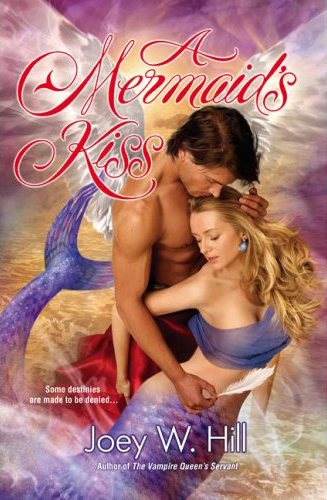
Last but not least, this: A Mermaid’s Kiss by Joey W. Hill. I don’t know what to say about this because I’m conflicted in so many directions, yet it’s stuck with me ever since I read it. I hesitate to do a review on it, but here I am 3 months later, still thinking about it. It’s supposed to be erotic. It’s not. The reasoning for the sex between the hero and heroine is flimsy at best, though I wasn’t any more put off by the more, ah, unusual aspects of it than I was by any of the other sex scenes, none of which were necessary to the story. The hero and heroine have sex with her in mermaid form and her in pixie form. I also didn’t like the fact that the heroine had so many configurations mermaid, pixie, human. The sex just … annoyed me. Why? Because I thought this was a terribly spiritual book with underpinnings of faith (some amalgam of Christianity and goddess mythos) and a keen insight on human behavior. In a lot of ways, its underlying theme reminded me of Dogma, although in a gut-wrenching way and not a satiric way. The sex got in the way of the character development (and worldbuilding) and pulled me out the story every single time. And it wasn’t even good sex.
It took me a while to write this post and 2008 was a busy year, but the ones I forgot must not have made an impact on me.
Book Review: The Duchess et al
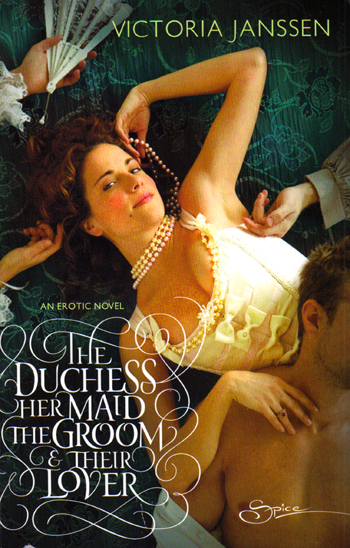 The Duchess, Her Maid, The Groom & Their Lover: An Erotic Novel
The Duchess, Her Maid, The Groom & Their Lover: An Erotic Novel
by Victoria Janssen
Published by Spice
Please note the title and study the cover a bit. Does that say “romance novel” to you? Me, neither.
And yet, despite the absence of the word “Harlequin” anywhere on the cover, on the copyright page, on the “coming attractions” back matter, apparently, Romancelandia thought this was a romance. I don’t know why, unless Romancelandia simply has no history with pure erotica.
There is a difference between romantic erotica and pure erotica (aka could-be-porn-if-that’s-your-definition) and perhaps Ellora’s Cave has just trained Romancelandia to read “romance” or “romantic erotica” where they see “erotic novel” or “erotica.”
I don’t know how this could have been mistaken for a romance.
Moving along. Jessica, over at Racy Romance Reviews, reviewed this and while her review wasn’t necessarily favorable, it was academic (’cause she R 1) and in no way (I thought) insulting. She also admitted that she didn’t have much experience with whatever “pure” erotica really is.
I wanted to read this book, but balked at paying $11.30 for the ELECTRONIC book, so someone took pity on me and sent it to me, requesting that, if possible, I review it because that person was interested in my opinion (though heaven only knows WHY!).
My opinion is that I can’t finish this book.
Why?
The nastiness that went on concerning a liveblogging “review” incident between Dear Author and Smart Bitches (NOT linking). I didn’t read the transcript, so I am not speaking to whether the liveblogging was nasty or not, but the comments on the thread really, really disheartened me. It destroyed any enjoyment I might have gotten out of it and made me want to pick nits where there were no nits to pick.
I read 40% of the book before I simply had to put it down, so I feel very cheated and I’m going to address others’ complaints of the book that apply to what I read and comment on those, then I’ll pick the two very big nits I actually did have.
COMPLAINTS:
 1. Nobody could figure out the setting, but thought it might be somewhere in 17th-18th Century France.
1. Nobody could figure out the setting, but thought it might be somewhere in 17th-18th Century France.
Okay, first, it’s erotica. Have we established this fact? It doesn’t need a setting. It’s a fairy tale and the descriptions were such that I envisioned a Neuschwanstein-type castle.
As long as the descriptions of the castle let you know these characters were amongst lush, and candles were the major source of light, and the clothes were voluminous and bulky, the exact place and time weren’t important.
2. That the sexual situations were totally ridiculous.
3. That Camille’s reasoning for escaping her abusive-cum-murderous husband RIGHT THEN was flimsy.
4. That there just happened to be brothels everywhere along the path they took on their escape route, doubling as inns.
5. There are eunuchs! In a place we think might be 17th-18th Century France. Eunuchs! What the fuck?
STRENGTHS:
I think Jessica summed it up best when she said this:
In some ways, despite the sexual sadism of the Duke, this book offers a very positive view of sex. Sex is the go-to coping strategy for most of life’s problems: Need an heir? Feeling stressed? Husband trying to kill you? Lonely? Bored? Want to show someone you have power over them? Need a place to stay for free? Want to escape those thugs? Need a favor? Want to convince someone to ally with you? Want to thank someone? The answer is sex, sex, sex, sex, and more sex.
That was its strength and its purpose. Why? Because it’s erotica. Have I mentioned that?
Okay, so now that we’ve got all that out of the way, here was my problem with what I read:
NIT ONE:
The cover. Come on. It’s gorgeous, absolutely breathtaking all textured and ripe with hot redhead right there in the center of groping hands and a pearl necklace around her neck (make of that what you will).
Except … Camille is described as having black hair with gray streaks.
FAIL.
NIT TWO, which is the genuine weakness of the book:
The sexual logical inconsistencies. “What?!?!” you cry. “You just finished telling us it was erotica and don’t get hung up on the ridiculousness of it. What could you possibly mean?” Not that way, you silly goose.
1. Camille needs an heir or her husband will kill her. Her husband is shooting blanks. She summons the groom to attempt to impregnate her because any child of his could pass for her husband’s. Okay, so far so good. Sounds like a plan. But immediately after finishing with the groom, she is summoned to her husband’s wannabe de Sade dungeon.
[Her husband] had to fuck her at least once, in case she had managed to become pregnant that afternoon.
Okay. We know she doesn’t want to, but we get the timing issue. But then he doesn’t. And not only does she not worry about this, it doesn’t even occur to her that she missed her chance to cover up her possible switcheroo.
2. Camille’s been married to this dude for 20 years and has been exposed (as a spectator and submissive) to every sexual deviance possible because he’s sick and twisted that way. And yet, this night, the relatively mild antics are … different? And now she’s aroused by them? After 20 years of debauchery? Really? Just now? No, I don’t believe it.
- She has eunuchs who are her bodyguards and, ostensibly, sexual servants. She has an ivory carving (dildo). In 20 years of exposure and being aroused (for the first time!) that night, she finally—FINALLY!—asks her eunuchs to pleasure her? No, I don’t believe it.
- In 20 years of exposure and forced sexual obeisance, she’s never given head until this night? (That’s the way I read it, anyway.) No, I don’t believe it.
In other circumstances, she might have enjoyed tasting so large a cock, but not in front of the duke.
So … has she or has she not experienced pleasure before? Has she or has she not given head? The implication before this passage is that she had (by force), but at this moment thinks about how delicious it might be if her husband wasn’t watching? Say what? No, I don’t believe it.
- It’s discussed that she was never unfaithful to her husband—in 20 years!—and just that day with the groom was the first time for seeking her pleasure elsewhere and the first time, in fact, that she’d known pleasure at all. No, I don’t believe it.
- Once the entourage takes to the road, it’s as if everything is a new experience for her, as in, she never knew X activity existed. She becomes lovers with her maid and the author makes a point of letting us know that she hasn’t had a woman. Really? In 20 years of Duke Debauchery and forced sexual obeisance and his own propensity toward voyeurism and she’s never done a woman? No, I don’t believe it.
I think I would have had a problem with Camille’s contradictory sexual history anyway, but I don’t think it would have made me simply put the book down and not want to pick it up again. The unpleasantness surrounding it combined with that simply destroyed any enjoyment I might have had.
Quite simply, it was a chore to read, which frustrated and disappointed me to no end because it was a book I wanted to read and expected to enjoy.
Since this was given to me, I’d like to pass it along. First person to email me gets it.
Book Review: Waiting for Spring
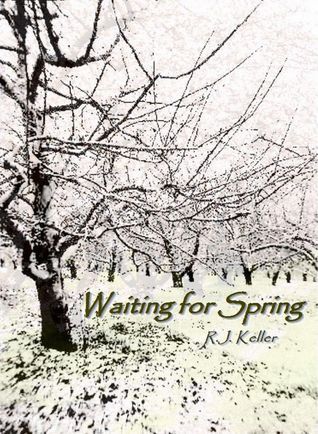 Waiting for Spring
Waiting for Spring
by RJ Keller
It’s been a long time since I threw common sense to the wind and stayed up to finish a book knowing how much I had to do the next day, but not resenting it the next day because it was totally worth it.
This book has no spiffy genre classification. After some thought, I think I’d call it “literary romance.” I don’t know what “women’s fiction” is and I’m not sure I really even know what “chick lit” is, but I’m pretty sure it’s not either of those. And you know, lately, I’ve been very happy with the books that haven’t been easily classified.
Here’s the blurb:
It’s not the kind of pain she can see and smell and wrap with an ace bandage. It’s the kind she tries to numb with sex and work and cleaning-cleaning-cleaning the house. The kind that comes from enduring a lifetime of rejection. First from her mother–whom Tess knows would have aborted her had the law allowed it–then from a string of men whose names she can never remember. And finally, at age thirty-four, from her husband of ten years; the man who once promised to love her forever.
You want angst? I gotcher angst right here, pal. And this is the good stuff, the kind that jerks you around and bashes you over the head and makes you come back for more to see how it all ends. In my experience with literary fiction (one of which was an Oprah pick—sue me), there seems to be some sort of unwritten rule about writing angst, which is to understate it, to let the subtleties of the angst dawn on the reader like a sunrise behind storm clouds.
Problem with that approach is that A) I don’t ever get to know or care about the characters enough to care about their angst and B) their angst isn’t that big of a deal anyway; if the characters clearly don’t care about their angst, why should I? So I’ll read literary fiction, don’t get me wrong, but later, I’ll scratch my head and say (if asked), “Yeah, I think I read that book, but I don’t remember the name or the author.” I just remember dipping my toe in the wading pool of that world once upon a time.
The main character, Tess, has angst and she doesn’t seem to care about her angst, either. But I cared about her angst from the very first paragraph:
They say actions speak louder than words. Maybe. But words do a hell of a lot more damage. Even well-meaning words spoken by well-meaning people.
People like Sister Patricia Mary Theriault. She was my catechism teacher when I was seven years old. Until she ruined my life. [ … ]
Then she told us about the bad soil. [ … ] But the only bad soil I heard about was this:
“As the Sower was scattering the seed, some fell along the path; it was trampled on and–”
Path. Trampled. Bad soil. [ … ]
“Don’t let your hearts become trampled down, children. Keep them soft and fertile so you can feel God’s love inside of you.”
Seven years old. And already I knew I was in some deep shit. The kind that even Sister Patricia couldn’t do anything about.
The twin hyperbolic allegories of “until she ruined my life” and “Seven years old. And already I knew I was in some deep shit” are not, actually, hyperbolic or allegorical, but the reader doesn’t find out why or how until far, far into the book.
You might be tempted to point out that this is simply excellent fiction infrastructure, to which I would say … yeah, I know. But I don’t see that a whole lot anymore. As far as I can tell, the current writing fad is to make me, Random Reader, ask the question and then never let it linger like a good combination of spices on my tongue or let me savor the moment of enlightenment when/if it happens.
Instead, it will ask the question and proceed to answer it for me 2 pages later and sometimes, even worse, will over-explain it in case I didn’t get it fast enough or thoroughly digest all the layers of subtext. I’m very tired of being treated like an idiot in my fiction and, further, I hate that I actually have to call attention to this amazingly annoying trend.
There are quite a few laugh-out-loud lines, sharp. Wry.
When Tess, age 34, takes Brian, age 25, as a lover, they finish, talk, then begin again not long after. Tess observes,
Ready again. Twenty-five. Gotta love that.
Keller also gives the reader glimpses of the spirituality that’s woven all through the tale; they glimmer, like the gold threads in shot fabric:
The stars, he said, were actually souls; all the souls that were too restless to be locked up in heaven. They were so restless that God let them stay outside at night to play.
And when an 8-year-old girl about to take her first communion asks Tess if she believes in God, Tess says:
“Yes, I believe in God. I just … I don’t feel close to him in church.”
“Really? Why’s that?”
I shrugged, even though I knew exactly why. I knew because I’d felt that way since I was a little girl, sitting in my church clothes, listening to the Mass. Trying to feel His presence. Struggling to feel His love. But there was nothing there. Nothing but words I didn’t completely understand and scary status. And then, one beautiful Sunday Spring morning when I was nine years old, something occurred to me. Something I never told anyone else.
He’s not really in here. God doesn’t live inside a building, and that’s all a church is; just a building filled with lots of words. [ … ]
Because Anne [of Green Gables] said that if she really wanted to talk to God, a real true prayer, then she’d have to go outside to do it. She’s need to surround herself with God’s creation, with His beauty; drink it in and let it fill her up. And then she could look heavenward and just feel a prayer.
The narrative itself is choppy, with sentences and paragraphs written in fits and starts, which perfectly mirrors Tess’s personality and her coping mechanisms (particularly her “personality disorder”). In fact, a good portion of Tess’s internal dialog and her observations are written as wry asides to herself and she is inviting you, Random Reader, to chuckle along with her.
And I did. Even while I had tears running down my cheeks.

